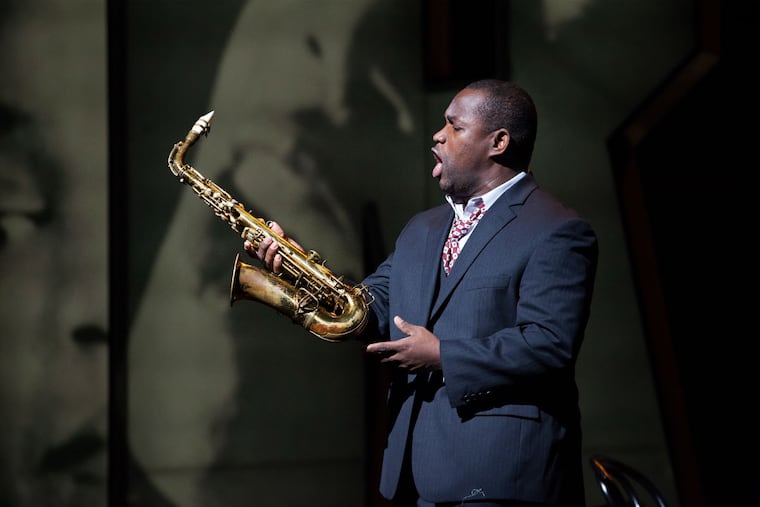'Yardbird' opera at the Apollo: A respectable success, despite the libretto, and not enough Parker
NEW YORK - The place, the subject and the performers all buoyed Charlie Parker's Yardbird on its Friday opening at the famous Apollo Theater in Harlem into the sort of event that allowed Opera Philadelphia's New York debut to be a respectable success - at least.

NEW YORK - The place, the subject and the performers all buoyed Charlie Parker's Yardbird on its Friday opening at the famous Apollo Theater in Harlem into the sort of event that allowed Opera Philadelphia's New York debut to be a respectable success - at least.
Visiting Philadelphians crowded the seats of this grand, Old World-style, 1,500-seat theater. Much cheering greeted the conclusion. Yet the piece itself (in the company's 2015 world premiere production) felt more problematic than before. No doubt being in the Apollo, once inhabited by Parker and many jazz greats whose photos are part of the production's set, prompts greater scrutiny of the opera's poetic veracity. Daniel Schnyder's score seems better than before - but especially weighed down by Bridgette A. Wimberly's libretto, with its endless bird imagery and little sense of when words should be sung or spoken.
In a genre full of hobbled libretti, this opera has a particular problem: Musicians tend to be doers rather than explainers, and here, the legendary saxophonist is explaining his way through a netherworld between life and death, granting him the time to write his masterpiece. Mother, wives and Dizzy Gillespie come and go, singing and explaining. A silent, crippled drug dealer/grim reaper visits periodically.
The music's manner feels like extended improvisation, burning at the emotional temperature of cool jazz, fueled by riff-like motifs but with constantly shifting rhythms that convey the instability of Parker's life. Best of all is the instrumental psych-ward music, whose long flute solo feels both vivid and sedated.
The big hole opera is Parker's own music. When he sings about how his sax was his voice, you want to hear it, whether imitation Parker or recordings of the real thing. Tenor Lawrence Brownlee, in the title role, had good flights of scat singing, and his sunny tenor voice parallels Parker's effortless lyricism and glistening vibrato that often rose above the mire of his life. Parker's darkness came more from Brownlee's manner than voice.
As his mother, soprano Angela Brown fused some too-low-for-comfort vocal writing into a warm, magnetic characterization. Will Liverman made a similar high-personality impression as Dizzy. Other Parker women had good vocal moments - Emily Pogorelc as Chan, Elena Perroni as Doris Parker, and Tamara Mumford as Nica - but couldn't mask the piece's lack of theatrical substance.
The Apollo required a sound-design arrangement that had singers with microphones, but to no ill effect. Music director Corrado Rovaris and the Opera Philadelphia orchestra were perfectly adept, but with Stan Kenton-esque exactitude in places that needed to swing.